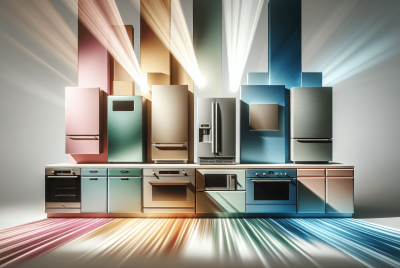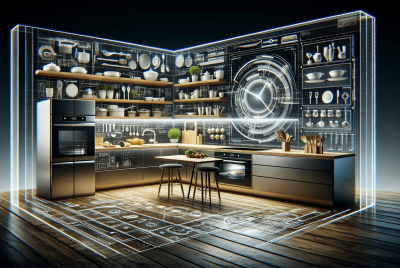What Is A Smart Kitchen Appliance?
Imagine having a kitchen that is not just a place to cook, but a personal assistant that makes your life easier. That’s the wonder of smart kitchen appliances. A smart kitchen appliance is a high-tech device that is equipped with advanced features and connectivity options, allowing you to control and monitor it remotely through your smartphone or voice assistant. From smart refrigerators that can create shopping lists and track food expiration dates to intelligent ovens that can preheat themselves before you even step foot in the kitchen, these appliances are revolutionizing the way we cook and interact with our kitchen spaces. Get ready to experience a whole new level of convenience and efficiency in the heart of your home.
What is a smart kitchen appliance?
A smart kitchen appliance is a cutting-edge device that incorporates advanced technology and connectivity to enhance the functionality and convenience of your kitchen. These appliances are equipped with features like remote control, voice control, and integration with virtual assistants, allowing you to control and monitor them from anywhere. They are designed to make your life easier by automating tasks, saving time and energy, and providing personalized experiences.

1. Definition and Overview of Smart Kitchen Appliances
1.1 What are Smart Kitchen Appliances?
Smart kitchen appliances are appliances that utilize internet connectivity and innovative technologies to offer intelligent capabilities. These appliances can communicate with other devices, analyze data, and make informed decisions to optimize performance. They are equipped with sensors, processors, and connectivity modules that enable them to connect to the internet and interact with users or other smart devices.
1.2 How do Smart Kitchen Appliances Work?
Smart kitchen appliances work by integrating various technologies to provide advanced features. They connect to your home’s Wi-Fi network, allowing you to control them remotely through a mobile app or voice commands. These appliances collect and analyze data to provide personalized recommendations, automate tasks, and enhance efficiency. They can also learn from user preferences and adapt their behavior over time.
1.3 Benefits of Smart Kitchen Appliances
Smart kitchen appliances offer numerous benefits that can improve your cooking experience and daily routines. Some of the key advantages include:
- Convenience: With remote control and voice control features, you can easily operate the appliances without being physically present in the kitchen.
- Time-saving: Smart appliances automate tasks like preheating, cooking, and cleaning, allowing you to multitask and save time.
- Energy efficiency: Many smart appliances are designed to optimize energy consumption, reducing your carbon footprint and utility bills.
- Customization: Smart appliances can learn your preferences and provide personalized experiences, such as recommending recipes based on your dietary restrictions or offering cooking tips tailored to your taste.
- Safety: Smart appliances are equipped with safety features like automatic shut-off and notifications for potential issues, ensuring a secure cooking environment.
2. Types of Smart Kitchen Appliances
2.1 Smart Refrigerators
Smart refrigerators are equipped with features like touchscreen displays, cameras, and app synchronization. They allow you to view the contents of your fridge through your smartphone, create shopping lists, and receive expiration date notifications. Some models even have built-in recipe databases and can suggest meal ideas based on the ingredients you have.
2.2 Smart Ovens
smart ovens offer features such as remote control, preheat functions, and recipe suggestions. They can be controlled through mobile apps or voice commands, allowing you to preheat the oven while you’re on your way back home. These ovens also offer precise temperature control, ensuring perfectly cooked meals.
2.3 Smart Dishwashers
Smart dishwashers provide features like monitoring water usage, energy efficiency reports, and remote control. They can be scheduled to operate during off-peak hours to save energy. Some models even have sensors that detect the dirtiness of the dishes and adjust the wash cycle accordingly.
2.4 Smart Cooktops
Smart cooktops come with touch controls, temperature sensors, and built-in safety features. They can be controlled remotely, allowing you to start or adjust cooking settings while you’re away. These cooktops also offer precise temperature control and even heating distribution for optimized cooking results.
2.5 Smart Coffee Makers
Smart coffee makers can be programmed to prepare your coffee at a specific time or controlled through a mobile app. Some models can even connect to your virtual assistant and respond to voice commands. These coffee makers ensure a fresh cup of coffee every morning without the need to be physically present in the kitchen.
2.6 Smart Microwaves
Smart microwaves offer features like remote start, sensor cooking, and voice control. They can be controlled through mobile apps or voice commands, allowing you to start cooking or adjust settings from anywhere. These microwaves also come with advanced sensors that detect the moisture and doneness level of your food to prevent overcooking.
3. Key Features and Capabilities of Smart Kitchen Appliances
3.1 Remote Control and Monitoring
One of the primary features of smart kitchen appliances is remote control and monitoring. Through the use of mobile apps, you can control and monitor your appliances from anywhere with an internet connection. Whether you want to preheat your oven, start the dishwasher, or check the contents of your refrigerator, you can do it all with just a few taps on your smartphone.
3.2 Voice Control and Integration with Virtual Assistants
Smart kitchen appliances are designed to seamlessly integrate with virtual assistants like Amazon Alexa, Google Assistant, or Apple Siri. This allows you to control your appliances through voice commands, making cooking and multitasking even more effortless. You can simply ask your virtual assistant to preheat the oven, brew a cup of coffee, or start the dishwasher, and it will be done.
3.3 Energy Efficiency and Sustainability
Smart kitchen appliances are built with energy efficiency in mind. They come with features like energy usage reports, eco-friendly modes, and scheduling options to optimize energy consumption. By using these appliances, you can reduce your energy bills and contribute to a greener environment.
3.4 Machine Learning and Artificial Intelligence
Many smart kitchen appliances incorporate machine learning and artificial intelligence technologies. They can learn your preferences, adapt to your cooking habits, and make personalized recommendations. For example, a smart oven can remember your preferred cooking temperature and time for certain recipes, ensuring consistent results every time.
3.5 Connectivity and Smart Home Integration
Smart kitchen appliances are designed to be part of a connected home ecosystem. They can connect with other smart devices in your home, such as lighting systems or security cameras, creating a seamless and integrated experience. For example, your smart oven can communicate with your smart refrigerator to adjust cooking temperatures based on the ingredients inside.

4. Popular Brands and Models of Smart Kitchen Appliances
4.1 Samsung Family Hub Refrigerator
The Samsung Family Hub Refrigerator is a highly advanced smart refrigerator that offers a wide range of features. It comes with a touchscreen display that allows you to view the contents of your fridge, create shopping lists, and even stream your favorite music or TV shows. With its built-in cameras, you can check on your groceries from anywhere using your smartphone.
4.2 LG ThinQ Smart Oven
The LG ThinQ Smart Oven is a versatile smart oven that offers remote control, recipe recommendations, and precise temperature control. It can be controlled through the LG ThinQ mobile app or through voice commands with Google Assistant or Amazon Alexa. The oven’s ProBake Convection system ensures even cooking results, and it even has a self-cleaning feature for easy maintenance.
4.3 Bosch Home Connect Dishwasher
The Bosch Home Connect Dishwasher is a top-of-the-line smart dishwasher that offers various advanced features. With the Home Connect app, you can control and monitor your dishwasher from anywhere. It provides energy usage reports, water consumption data, and even sends notifications when the dishwasher needs maintenance. The dishwasher’s AquaStop feature prevents leaks and offers enhanced safety.
4.4 GE Profile Smart Cooktop
The GE Profile Smart Cooktop is a sleek and innovative cooktop that brings advanced technology to your kitchen. It offers features like Wi-Fi connectivity, precise temperature control, and built-in safety mechanisms. With the GE Kitchen app, you can control the cooktop and receive alerts on your smartphone. The cooktop’s syncing capability allows you to combine two burners into one for larger cookware.
4.5 Nespresso Expert Coffee Maker
The Nespresso Expert Coffee Maker is a smart coffee maker that takes your coffee experience to the next level. It can be controlled through the Nespresso mobile app or through voice commands with Amazon Alexa. The coffee maker allows you to customize your coffee size, temperature, and brewing time. With its integrated Aeroccino milk frother, you can easily prepare specialty coffee drinks.
4.6 Whirlpool Smart Microwave
The Whirlpool Smart Microwave offers advanced features like remote start, Scan-to-Cook technology, and voice control with compatible virtual assistants. It can be controlled through the Whirlpool mobile app, allowing you to start cooking from anywhere. The microwave’s sensor cooking feature adjusts cooking time and power levels based on the food’s moisture and doneness level.
5. Smart Kitchen Appliances and the Internet of Things (IoT)
5.1 Role of IoT in Revolutionizing the Kitchen
The Internet of Things (IoT) has played a significant role in revolutionizing the kitchen. By connecting smart kitchen appliances to the internet, they can communicate with each other and provide enhanced functionalities. IoT has made it possible to control and monitor appliances remotely, automate tasks, and create personalized experiences for users.
5.2 Interconnectivity and Data Sharing
With the interconnectivity provided by IoT, smart kitchen appliances can share data and work together to optimize performance. For example, a smart oven can receive information from a smart refrigerator about the ingredients inside, and adjust cooking settings accordingly. This data sharing enables a more efficient and intuitive cooking process.
5.3 Privacy and Security Concerns
The proliferation of IoT devices in the kitchen raises concerns about privacy and security. As these appliances collect and process data, it’s crucial to ensure that the information is handled securely. Manufacturers need to implement robust security measures, such as encryption and data anonymization, to protect user privacy. It’s also essential for users to regularly update their devices and be cautious about sharing personal information.
6. Integration with Mobile Apps and Smart Home Systems
6.1 Control and Monitoring through Mobile Apps
Smart kitchen appliances can be controlled and monitored through dedicated mobile apps provided by manufacturers. These apps allow you to access the features and settings of your appliances, receive notifications and alerts, and even troubleshoot issues. With mobile app integration, you can conveniently manage your kitchen appliances from your smartphone or tablet.
6.2 Integration with Smart Home Systems
Smart kitchen appliances can be integrated into larger smart home systems, enabling centralized control and automation. By connecting with platforms like Apple HomeKit or Samsung SmartThings, you can synchronize your smart kitchen appliances with other devices in your home, such as lighting systems, thermostats, or security systems. This integration provides a seamless and cohesive experience for managing your entire home.
7. Future Trends and Innovations in Smart Kitchen Appliances
7.1 Advanced Sensors and Internet Connectivity
The future of smart kitchen appliances lies in further advancements in sensor technology and internet connectivity. Sensors will become more sophisticated, allowing appliances to gather more detailed information about ingredients, cooking environments, and user preferences. Increased internet connectivity will enable appliances to communicate with each other seamlessly, making the kitchen a truly interconnected space.
7.2 Predictive Cooking and Recipe Suggestions
Future smart kitchen appliances will harness the power of artificial intelligence and machine learning to offer predictive cooking capabilities. These appliances will learn from vast recipe databases, user preferences, and real-time data to suggest personalized recipes and cooking techniques. They will anticipate your needs and provide step-by-step instructions to achieve optimal results.
7.3 Personalized User Profiles
Smart kitchen appliances will become more intuitive and adaptable by incorporating personalized user profiles. Each family member will have their own profile, allowing appliances to memorize individual preferences and provide customized experiences. For instance, a coffee maker will automatically brew each person’s preferred coffee blend and strength, eliminating the need for manual adjustment.
7.4 Sustainability and Waste Reduction
As sustainability becomes a growing concern, future smart kitchen appliances will prioritize energy efficiency and waste reduction. They will utilize advanced sensors to optimize cooking times, reduce energy consumption, and prevent food waste. Smart refrigerators will monitor expiry dates and provide meal suggestions to utilize ingredients before they spoil, reducing food waste.
7.5 Integration with Augmented Reality
Augmented reality (AR) will play a significant role in the future of smart kitchen appliances. AR technology will allow users to overlay digital information onto their cooking environments, providing real-time guidance and assistance. From step-by-step cooking instructions to virtual measurements, AR will enhance the cooking experience and empower users with accurate and detailed guidance.
8. Considerations for Purchasing Smart Kitchen Appliances
8.1 Budget and Affordability
Before purchasing smart kitchen appliances, it’s essential to consider your budget and affordability. These appliances often come with premium features and innovative technology, which can increase their price compared to traditional appliances. Set a budget and prioritize the features that are most important to you to ensure you find the best value for your money.
8.2 Compatibility with Existing Kitchen Setup
Another crucial consideration is the compatibility of smart kitchen appliances with your existing kitchen setup. Ensure that the appliances you choose can fit into the available space and align with the existing electrical and plumbing connections. It’s also important to check if the appliances are compatible with your home’s Wi-Fi network and any other required connectivity.
8.3 User-Friendliness and Learning Curve
Evaluate the user-friendliness of the smart kitchen appliances you are considering. Look for appliances with intuitive interfaces, easy-to-understand controls, and clear instructions. Consider the learning curve associated with operating and managing the appliances. Choose appliances that offer a balance between advanced features and user-friendly designs to ensure a seamless user experience.
8.4 Availability of Support and Updates
When purchasing smart kitchen appliances, verify the availability of support and updates from the manufacturer. Ensure that the manufacturer provides reliable customer support, including troubleshooting assistance, warranty coverage, and software updates. Regular updates are crucial to ensure that your appliances continue to function optimally and remain compatible with evolving technologies.
9. Conclusion
Smart kitchen appliances have revolutionized the way we cook and manage our kitchens. With their advanced features, connectivity, and integration with virtual assistants, they offer convenience, flexibility, and personalized experiences. From smart refrigerators to ovens, dishwashers, cooktops, coffee makers, and microwaves, these appliances provide time-saving solutions and optimize energy consumption. As technology continues to advance, future innovations in smart kitchen appliances will focus on predictive capabilities, personalization, sustainability, and a seamless integration with augmented reality. When considering purchasing smart kitchen appliances, it’s essential to assess your budget, compatibility, user-friendliness, and the availability of support and updates. Embracing smart kitchen appliances can enhance your cooking experience and simplify your daily routines, making your kitchen truly smart and efficient.



